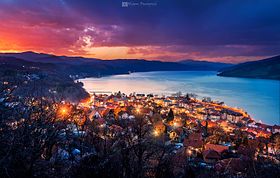Majdanpek
|
Majdanpek Мајданпек |
||||
|---|---|---|---|---|
| Town and municipality | ||||
From top: Majdanpek panorama, Donji Milanovac town panorama
|
||||
|
||||
 Location of the municipality of Majdanpek within Serbia |
||||
| Coordinates: 44°25′N 21°56′E / 44.417°N 21.933°ECoordinates: 44°25′N 21°56′E / 44.417°N 21.933°E | ||||
| Country |
|
|||
| Region | Southern and Eastern Serbia | |||
| District | Bor | |||
| Settlements | 14 | |||
| Government | ||||
| • Mayor | Dejan Vagner (SNS) | |||
| Area | ||||
| Area rank | 15th | |||
| • Municipality | 932 km2 (360 sq mi) | |||
| Elevation | 498 m (1,634 ft) | |||
| Population (2011 census) | ||||
| • Rank | 77th | |||
| • Town | 10,109 | |||
| • Municipality | 18,686 | |||
| Time zone | CET (UTC+1) | |||
| • Summer (DST) | CEST (UTC+2) | |||
| Postal code | 19250 | |||
| Area code | +381(0)30 | |||
| Car plates | BO | |||
| Website | www |
|||
Majdanpek (Serbian Cyrillic: Мајданпек) is a town and municipality located in the Bor District of the eastern Serbia. According to 2011 census, the municipality of Majdanpek had a population of 18,686 people, while the town of Majdanpek had a population of 10,109.
The name "Majdanpek" is derived from the words majdan meaning "quarry" (from Arabic maydān) and meaning "much, big, very" in Turkish. In Serbian Vlach (and Romanian), the town is known as simply Maidan.
The transition out of the Stone Age occurred between 6000 BCE and 2500 BCE for much of humanity living in North Africa and Eurasia. The first evidence of human metallurgy dates to between the 5th and 6th millennium BCE in the archaeological sites of Majdanpek, Yarmovac, and Pločnik in modern-day Serbia (a copper axe from 5500 BCE belonging to the Vinca culture), though not conventionally considered part of the Chalcolithic or "Copper Age", this provides the earliest known example of copper metallurgy.Chalcolithic excavations exist in Kapetanova Pecina, Praurija, Kameni Rog and Roman site of Kamenjar.
The town is famous as a copper mine district, since the early 17th century. The origin of the name is based on words majdan (related to Turkish madän, mine) and river Pek - mine on river Pek. Throughout its history, mining development was held by many foreign owners (Czechs, Belgians, Austrians), and was extensively exploited. The town was industrialized in the mid-20th century, by the industrial program supported by SFR Yugoslavia's Government of that time, and the personal influence of J.B.Tito (marshal and lifetime prime minister since the end of World War II until 1980). Through the late 20th century, the town was in a period of industrial progress and one of the most developed areas in copper mining and metallurgy.
...
Wikipedia



